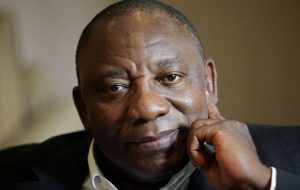

South Africa’s R4.7 trillion “unsustainable public debt levels”, including low growth rates, forced President Cyril Ramaphosa to consider cutting the government’s size to stabilise the economy, the Presidency has told News24.
This while a public sector union claimed 80 000 jobs would be cut from the government, calling the move “insane”.
On Tuesday, Presidency spokesperson Vincent Magwenya said public-sector expenditure cuts, which he called “a complex exercise” that took time, would be prioritised over the next nine months to “restore confidence and bolster the growth strategy going forward”.

Cyril Ramaphosa, President of South Africa.
He was reacting to a recent Sunday Times report that Cabinet mandated the National Treasury to “work with all government departments and relevant stakeholders in [the] national government, as well as with provinces, to identify immediate measures to reduce the level of government spending”.
Magwenya added that cuts were necessitated by “unsustainable public debt levels due to stagnant GDP growth”.
He said the Covid-19 pandemic had impacted spending and revenue collection, while the economy was hampered by the “simultaneous growth and unemployment crisis; and low growth due to declining levels of fixed investment, economic concentration, inefficient rail and ports, and high cost of doing business, among other contributors”.
On 5 September, the Treasury announced that the economy grew by a higher-than-expected 0.6% between April and June after expanding by 0.4% in the year’s first three months, well shy of the 5% growth rates the government said it needed to reduce the 32.6% unemployment rate.
Magwenya acknowledged that the country’s freight rail system was in turmoil and impacted economic growth. This was echoed by logistics parastatal Transnet reporting a staggering R5.7 billion loss in its last financial year owing to low volumes transported due to dilapidated infrastructure.
But the Public Service and Commercial Union of South Africa (PSCU), in a statement to News24 on Tuesday, alleged that the government was “insane to get rid of 80 000 public servants”, adding that, should the planned retrenchments go ahead, it would be akin to “cutting the flesh, not fat”.
PSCU deputy president Astrid Al-Anani said:
Cosatu also rejected the expected job cuts, saying although the union “appreciated” the state’s financial constraints, the Treasury was “reckless” in recommending employment losses during a bleak economic period.
In his February budget, Finance Minister Enoch Godongwana said the country’s debt was R4.7 trillion, supporting Cosatu’s view that the state’s fiscal position is weak.
Cosatu, however, added: “What is needed now is to grow the economy. That is the only sober path to pay down our worrying debt trajectory. Pickpocketing nurses and underpaying police officers is not a solution.”
But Magwenya said the government was implementing a range of reforms – including the social relief of distress grant (R350 payments to unemployed adults) and amendments to electricity regulation allowing private energy generation to stem crippling power cuts – to “restore efficiency and competitiveness of key industry supply chains”.
“So, based on the assessment of progress and analysis of the global and domestic environment, the president is driving focus on the actions the government must take to decisively shift the country’s growth trajectory. The president wants more impetus on the second wave of reform that is going to make a profound and lasting difference,” Magwenya said.
EDITOR’S NOTE: After the story was published on Tuesday, the Presidency updated its comments to News24, clarifying that the reforms would not be completed in nine months as was initially phrased, but prioritised over the same period. This story has been updated with the clarification.